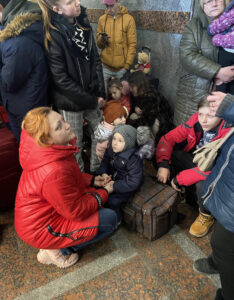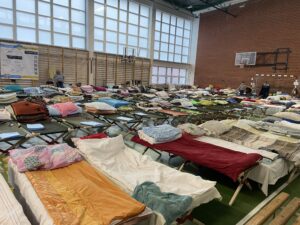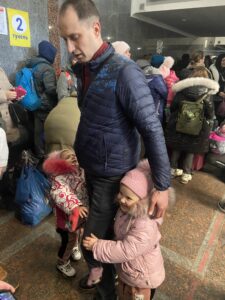According to Foreign Policy Magazine, since the start of the war in Ukraine more than 2.3 million refugees have crossed the border into Poland, moving the country from 101st globally in the number of refugees hosted in 2021 to second place a bare three weeks later.
However, for one Kansas journalist, the refugee crisis spawned by the invasion is not just bare numbers on a page.

Former Kansas Journalist Gwen Baumgardner, a reporter for Straight Arrow News, was on the ground in Poland and western Ukraine and saw the human toll first hand.
“Just speaking to … especially the mothers, they have no idea if they will ever see their husbands again,” Baumgardner said in an exclusive interview with The Sentinel. “But their main priority is to take their kids to safety, which means going into a country where they have no resources.
“They cannot speak the language. They have no connections, but they are willing to do that for their family.”
Baumgardner said the “Ukrainian spirit” that is much-talked-about in the media is a real thing.
 “So many people who have absolutely no military experience, are willing to stay and fight for their country — even though maybe they could get out of the country if they wanted to,” she said. “I really do think that when we hear about the ‘Ukrainian spirit’ that is absolutely there.”
“So many people who have absolutely no military experience, are willing to stay and fight for their country — even though maybe they could get out of the country if they wanted to,” she said. “I really do think that when we hear about the ‘Ukrainian spirit’ that is absolutely there.”
One woman they met, Dasha, was waiting to travel to Poland. Her husband is in the military and stayed behind to fight. They traveled several days to get to western Ukraine. At one point, they had to hide under train station benches when air raid sirens went off because the shelters were full.
Ending up on the other side of the world
Baumgardner, daughter of Kansas Senator Molly Baumgardner, and her reporting partner Shannon Longworth watched the run-up to the invasion and pressured their bosses to allow them to go to Ukraine and report.
“I’m a night owl up late at night,” she said. “And the first reports come through that it actually has happened and this process is started.”

Despite having plenty of work in the U.S., Baumgardner said covering the war from the states simply didn’t seem like the best way.
“It feels difficult as a journalist covering things from afar,” she said. “So myself and another journalist, her name is Shannon Longworth, we went to our bosses and said, ‘hey, it sounds a little crazy, but could we go to Ukraine?’ and that was an immediate ‘no.'”
Baumgardner said she and Longworth then suggested going to Russia to cover the protests that were already gaining steam and were turned down for that as well but then suggested Poland.
“We were like, ‘what about Poland? Could we cover this refugee crisis because it is just starting now, but this is going to be something,’ and they said, ‘we’ll think about it.’ Then finally, a couple of weeks ago, they gave us the all-clear that ‘yes, you could go to Poland.'”
Baumgardner said they were then able, after making contacts in Poland, to make their way into western Ukraine — away from the war zone — to report on the refugee crisis.
“The people that I spoke with were Ukrainian, they were the ones that were staying in Ukraine,” she said. “They felt like they had a specific role to play.
“The people that spoke with us — they felt obligated to speak to Western media and I was told by multiple people that ‘I really don’t feel comfortable sharing my story, but I know if I don’t, people in other parts of the world will start to forget about us.'”
Aid needed in Ukraine and Poland
While Ukraine certainly needs military aid in the form of weapons and ammunition, Ukraine and Poland also need aid for the refugees.
“For weeks the big rush was ‘how do we send aid to Ukraine,'” she said. Not realizing that these surrounding countries — Poland, especially — are taking in millions of people, and they do not have the infrastructure to do that.
“So now, I think there’s been a little bit of a turn where it’s ‘yes, we will send aid to Ukraine. We’ll send tactical aid, we’ll send this but also, refugees need help as well.'”
While the UN and International Red Cross are certainly on the ground in eastern Poland and western Ukraine, they weren’t there when the fighting began — and simply do not have the resources to be in every small community.

Consequently, Baumgardner said, the local residents have instead simply done the work themselves.
“A lot of the shelters along the border are grassroots efforts where it is the town or city, that has just come together and said, ‘you know, the Red Cross hasn’t come in, the UN hasn’t come in, so we have to do this ourselves.”
Some aid is finding its way in, however, even as Baumgardner said the Polish people are opening their homes.
“What was appreciated, we were told, were some of the American organizations or volunteers that were coming over and they were bringing aid with them,” she said. “Whether it was diapers or food or toys or books for kids that was appreciated.
“When we were over there they said they really needed sleeping bags and yoga mats that people could use as bedding, because even if they do find housing. normally it is one room for an entire family.”
 Longworth and Baumgardner met a man named Vitali at the Lviv train station, waiting with his wife and children for a train out of Ukraine. He said, “My whole life is in Kharkiv. My apartment, my car. Everything that I gained through the years is there. Now I’m here with my kids and two suitcases. And that’s my life now.”
Longworth and Baumgardner met a man named Vitali at the Lviv train station, waiting with his wife and children for a train out of Ukraine. He said, “My whole life is in Kharkiv. My apartment, my car. Everything that I gained through the years is there. Now I’m here with my kids and two suitcases. And that’s my life now.”
Baumgardner said she was inspired, not just by the Ukrainian people, but by the Polish people as well.
“Thousands of Polish people are just opening up their homes to complete strangers, where there is a total language barrier,” she said. “While we were there we met with a Polish family which lives in a small apartment. They opened up their home to a mother and daughter who were Ukrainian refugees.
“They don’t speak Ukrainian, the Ukrainian family doesn’t speak Polish, and yet, they still make it work. And they feel after a couple of weeks that they are now like this big family even though there are so many elements mixed in — the language barrier, the trauma, the unknown. And I just think it’s so incredible the fact that families are opening up their home and not knowing when there’s an ending.”



